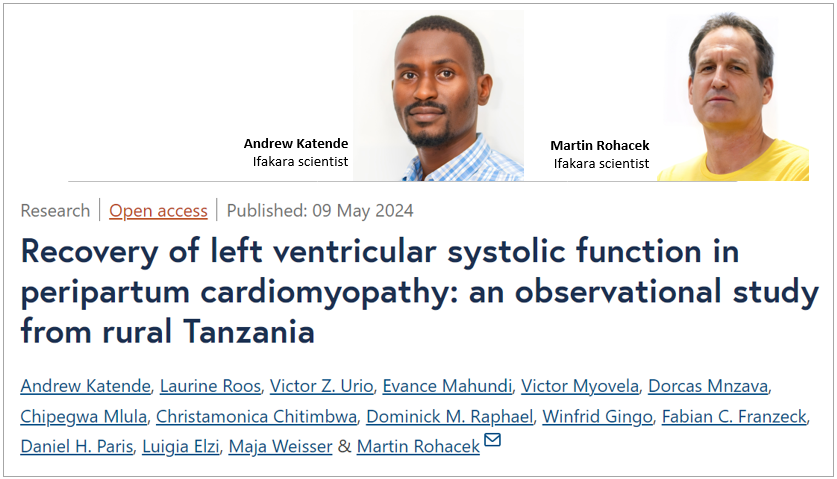
MATERNAL HEALTH: Specialized care can help cure pregnancy-related heart condition

A new study has found that a majority of women in rural Tanzania suffering from a serious heart condition related to pregnancy, known as peripartum cardiomyopathy (PPCM), can fully recover when given specialized medical care. This promising discovery offers hope to many women in similar situations worldwide.
Published on the BMC Cardiovascular Disorders journal, the study found that 69% of the participants fully recovered their heart function after a follow-up period of nearly nine months. These findings underscore the importance of specialized care and timely treatment for improving outcomes in affected women.
The study was led by scientists Andrew Katende and Laurine Roos from Ifakara Health Institute and Swiss TPH, along with their colleagues from St. Francis Regional Referral Hospital, University of Basel, and Regional Hospital of Bellinzona e Valli.
What is peripartum cardiomyopathy?
PPCM is defined as a weakening in cardiac function presenting typically between the last month of pregnancy and up to six months postpartum. The condition is characterized by weakened heart muscles, leading to reduced blood flow and potential heart failure.
As explained by the scientists in their paper, “Peripartum cardiomyopathy (PPCM) is a potentially life-threatening condition typically presenting as heart failure with reduced ejection fraction in the last month of pregnancy or within 5 months following delivery in women without any known cause of heart failure.
Learn more about PPCM here.
Prevalence and demographics of PPCM
In the USA, PPCM affects 1 in 1,000 to 4,000 pregnant women, with the lowest incidence in Hispanics and the highest in African Americans. In South Africa, 1 in 1000 deliveries is affected, in Haiti 1 in 300 and in North-western Nigeria 1 in 100, noted the scientists.
In rural Tanzania at a referral hospital in Ifakara, among 815 adults diagnosed with heart disease within 23 months, PPCM was diagnosed in 11.5% of female study participants with a median left ventricular ejection fraction (LVEF) of 30%, they added.
“This variable geographical occurrence of PPCM indicates the influence of environmental risk factors and genetic susceptibility to PPCM. The most relevant known risk factors for PPCM are ethnic background, preeclampsia, smoking, multiparity, and multifetal pregnancy.”
Findings and factors influencing recovery
The study, conducted at St. Francis Regional Referral Hospital in Ifakara, Tanzania, tracked 110 women diagnosed with PPCM from December 2015 to September 2021. It found that 69% of these women managed to regain normal heart function after receiving proper medical treatment. Key predictors of recovery included a higher initial measure of heart function (LVEF) and younger age.
According to scientists, two main predictors of recovery included a higher initial measure of heart function (LVEF) which was linked to better recovery, and older age which was linked to poorer recovery.
"Predictors of full recovery of the LV systolic function were LVEF at baseline and age, with a higher LVEF at baseline being associated with improved recovery, and older age being inversely associated with improvement of the LV systolic function," the scientists noted.
Comparison to other regions
The scientists also compared these findings to similar studies in other regions, noting a higher recovery rate for their study. The differences in outcomes were attributed to factors such as quicker initiation of treatment after delivery, better access to specialized medical care, and differences in medication use. However, the study also acknowledges limitations like potential selection bias and the financial burden on participants for medication.
First study of its kind in sub-Saharan Africa
To date, this is the first study to include study participants with PPCM from a rural area in sub-Saharan Africa who received specialized care, underscored the scientists, with all echocardiograms performed according to international guidelines by experienced echocardiographers.
Importance of specialized care and timely treatment
In conclusion, the scientists emphasized the need for specialized care and timely treatment for women with PPCM and highlighted the influence of initial heart function and age on recovery prospects.
“Women with PPCM need specialized care for the diagnosis and treatment of their condition, along with clinical and echocardiographic follow-up to adjust and maximize treatment adherence,” they noted.
The findings suggest that with proper medical attention, many women with PPCM can achieve significant improvement in heart function.
Ifakara scientists contribute
The study was led by scientists Andrew Katende and Laurine Roos from Ifakara Health Institute and Swiss TPH, along with their colleagues from St. Francis Regional Referral Hospital, University of Basel, and Regional Hospital of Bellinzona e Valli.
Other Ifakara scientists include Victor Urio, Evance Mahundi, Dorcas Mnzava and Maja Weisser including Martin Rohacek who supervised the study.
Read publication here.
